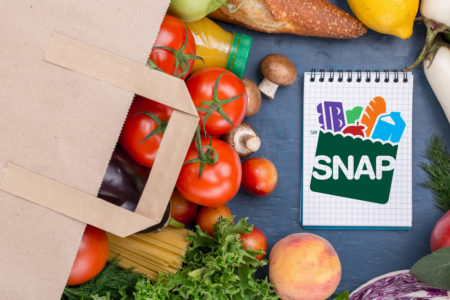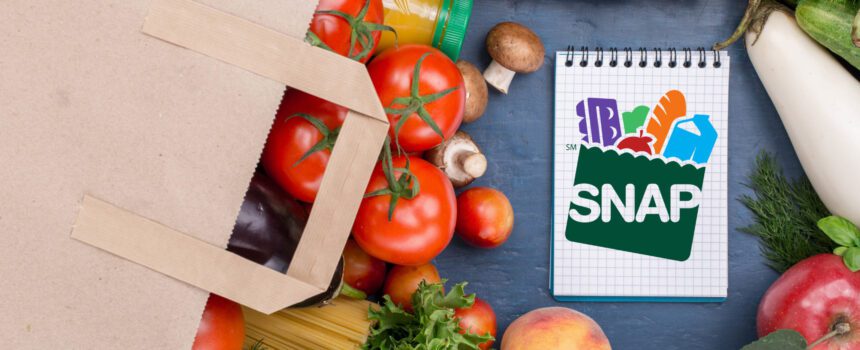Written by Kayla Whitehouse
The Supplemental Nutrition Assistance Program (SNAP), formerly known as food stamps, is a federal nutrition program that supplements the food budget of low-income individuals and families. Late last year, the United States Department of Agriculture (USDA) finalized a rule change to SNAP. Under the new rule, 668,000 people nationwide will lose their SNAP benefits; 90,000 of them are from Pennsylvania. This rule change will increase food insecurity, increase poverty, and hurt local businesses that rely on SNAP benefits being redeemed at their stores. The rule change is slated to go into effect on April 1, 2020.
SNAP Work Eligibility and Waivers
 The new rule targets “able-bodied adults without dependents” (ABAWDs). Under the current rules these individuals must work, volunteer, or participate in a job training program for at least 20 hours per week. If unable to meet these requirements, an ABAWD is limited to receiving three months of SNAP benefits every three years. States can apply for waivers from these requirements for geographic areas that are experiencing high unemployment or a lack of available jobs.
The new rule targets “able-bodied adults without dependents” (ABAWDs). Under the current rules these individuals must work, volunteer, or participate in a job training program for at least 20 hours per week. If unable to meet these requirements, an ABAWD is limited to receiving three months of SNAP benefits every three years. States can apply for waivers from these requirements for geographic areas that are experiencing high unemployment or a lack of available jobs.
The new rule change severely limits states’ ability to apply for these waivers by changing two criteria: size of a permissible waiver area and speed of response. Currently, states have the flexibility to grant waivers based on the average poverty level across a region, and recent unemployment data is used to determine waiver eligibility. Under the new rule, only designated Labor Market Areas (LMAs) can be granted waivers, poverty levels cannot be averaged, and use of historical data to determine eligibility will slow the process of granting waivers.
In 2016, West Virginia ran a nine-county pilot study, sharply limiting SNAP waivers and enforcing the work requirement. What have we learned from this pilot program in West Virginia? That work requirements don’t work. SNAP participation decreased, while employment growth in the nine counties slowed or remained stagnant. Meanwhile, the need for food bank and food pantry services soared.
Barriers to Meeting Work Requirements
Meeting SNAP work requirements can be very difficult for many people. While current unemployment levels may be low, involuntary part-time work is at an all-time high. The Ohio Association of Food Banks has identified barriers to stable employment in the ABAWD population they serve. First, communication is often difficult: many ABAWDs seeking food bank services do not have a permanent address, consistent phone access, or an email. This limits the ability of individuals to apply for jobs and for employers to contact them. Second, many ABAWDs do not have a reliable form of transportation. Those that rely on the bus are limited by transit routes, the cost of bus fare, and longer travel times. Owning a car presents the risk that it will require repair services that an individual can’t afford. Third, many ABAWDs report a physical or mental disability, while others report caring for children or relatives; they are not in fact able-bodied or without dependents. Finally, additional barriers exist for veterans, undereducated individuals, former foster care youth, homeless individuals, formerly incarcerated individuals, people in rural areas, and people of color.
The Impact of Losing SNAP
 Decreasing SNAP participation also impacts local businesses. Over eighty percent of authorized SNAP retailers are small businesses; grocery retailers already operate at small margins, and fear losing revenue from SNAP recipients. In areas of high poverty, SNAP recipients may make up a significant portion of retailers’ income. The government reports that every dollar in SNAP benefits generates $1.72 in economic activity.
Decreasing SNAP participation also impacts local businesses. Over eighty percent of authorized SNAP retailers are small businesses; grocery retailers already operate at small margins, and fear losing revenue from SNAP recipients. In areas of high poverty, SNAP recipients may make up a significant portion of retailers’ income. The government reports that every dollar in SNAP benefits generates $1.72 in economic activity.
Poverty is a comprehensive set of difficulties that impacts an individual’s ability to become and stay employed. Poverty is cyclical and food insecurity is a symptom of poverty. Taking SNAP benefits away from people will only perpetuate that cycle. A hungry person will be less productive. Spending time trying to locate food takes time away from preparing for an interview. Money reallocated to purchase food is money that can’t pay for healthcare.
Recently, USDA’s rhetoric has focused on the importance of “hard work, responsibility, and self-sufficiency” for SNAP recipients; however, this rule change has nothing to do with hard work and responsibility, and certainly doesn’t help anyone find their path towards self-suffiency. Making a person’s precarious situation even more precarious isn’t a path to stability. Work requirements increase hunger – not employment.
